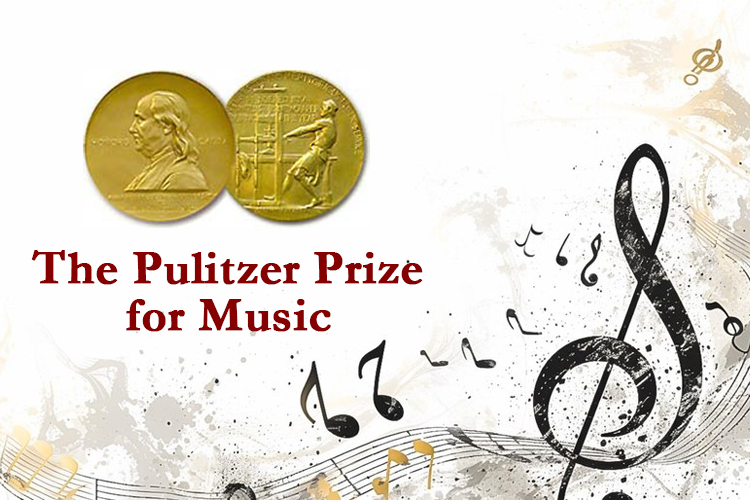The Pulitzer Prize for Music

Music is one of seven categories in the annual Pulitzer Prizes, awarded by Columbia University in New York City. The prize, named after prominent journalist and newspaper publisher Joseph Pulitzer, was first awarded in 1943. Previously, the university awarded an annual scholarship for music, but later transformed it into an award. The Pulitzer Prize Board, composed of judges appointed by the university, selects the candidates, and the awards are presented each May.
List of Pulitzer Prize Winners for Music:
- 1943: William Schuman, Secular Cantata.
- 1944: Howard Hanson, Symphony.
- 1945: Aaron Copland, Appalachian Spring, ballet.
- 1946: Leo Sowerby, The Canticle of the Sun.
- 1947: Charles Ives, Symphony No. 3
- 1948: Walter Piston, Symphony No. 3
- 1949: Virgil Thomson, Louisiana Story, film score.
- 1950: Gian Carlo Menotti, The Consul, opera.
- 1951: Douglas Stuart Moore, Giants in the Earth, opera.
- 1952: Gail Kubik, Symphony Concertante.
- 1953: No prize.
- 1954: Quincy Porter, Concerto Concertante for two pianos and orchestra.
- 1955: Gian Carlo Menotti, The Saint of Bleecker Street, opera.
- 1956: Ernst Toch, Symphony No. 3.
- 1957: Norman Dello Joio, Meditations on Ecclesiastes.
- 1958: Samuel Barber, Vanessa, opera.
- 1959: John La Montaine, Piano Concerto No. 1, Op. 9.
- 1960: Elliott Carter, String Quartet No. 2.
- 1961: Walter Piston, Symphony No. 7.
- 1962: Robert Ward, The Crucible, opera.
- 1963: Samuel Barber, Piano Concerto.
- 1964: No prize awarded.
- 1965: no prize awarded (See Duke Ellington).
- 1966: Leslie Bassett, Variations for Orchestra.
- 1967: Leon Kirchner, Quartet No. 3 for strings and electronic tape.
- 1968: George Crumb, Echoes of Time and the River.
- 1969: Karel Husa, String Quartet No. 3.
- 1970: Charles Wuorinen, Time's Encomium
- 1971: Mario Davidovsky, Synchronisms No. 6 for Piano and Electronic Sound (1970)
- 1972: Jacob Druckman, Windows
- 1973: Elliott Carter, String Quartet No. 3
- 1974: Donald Martino, Notturno
- 1975: Dominick Argento, From the Diary of Virginia Woolf
- 1976: Ned Rorem, Air Music
- 1977: Richard Wernick, Visions of Terror and Wonder
- 1978: Michael Colgrass, Deja Vu for percussion and orchestra
- 1979: Joseph Schwantner, Aftertones of Infinity
- 1980: David Del Tredici, In Memory of a Summer Day (for soprano and orchestra).
- 1981: No award.
- 1982: Roger Sessions, Concerto for Orchestra.
- 1983: Symphony No. 1 (Three Movements for Orchestra) Ellen Taaffe Zwilich
- 1984: Bernard Rands, Canti del sole (for solo voices and orchestra).
- 1985: Stephen Albert, RiverRun (symphony).
- 1986: George Perle, Wind Quintet IV.
- 1987: John Harbison, The Flight into Egypt (for soprano, baritone, chorus, and orchestra).
- 1988: William Bolcom, 12 New Etudes for Piano.
- 1989: Roger Reynolds, Whispers out of Time (for string orchestra).
- 1990: Mel Powell, Duplicates: A Concerto for Two Pianos and Orchestra.
- 1991: Shulamit Ran, Symphony.
- 1992: Wayne Peterson, The Face of the Night, the Heart of the Dark (for orchestra).
- 1993: Christopher Rouse, Trombone Concerto.
- 1994: Gunther Schuller, Of Reminiscences and Reflections (for orchestra).
- 1995: Morton Gould, Stringmusic (for orchestra).
- 1996: George Walker, Lilacs (for voice and orchestra).
- 1997: Wynton Marsalis, Blood on the Fields (oratorio for jazz orchestra and voices).
- 1998: Aaron Jay Kernis, String Quartet No. 2 (Musica Instrumentalis).
- 1999: Melinda Wagner, Concerto for Flute, Strings, and Percussion.
- 2000: Lewis Spratlan, Life Is a Dream, Opera in Three Acts: Act II, Concert Version.
- 2001: John Corigliano, Symphony No. 2 for String Orchestra.
- 2002: Henry Brant, Ice Field (for orchestra).
- 2003: John Adams, On the Transmigration of Souls (for orchestra, chorus, children's choir, and pre-recorded sound track).
- 2004: Paul Moravec, Tempest Fantasy (chamber music).
- 2005: Steven Stucky, Second Concerto for Orchestra.
- 2006: Yehudi Wyner, Chiavi in mano (piano concerto).
- 2007: Ornette Coleman, Sound Grammar (for jazz ensemble).
- 2008: David Lang, The Little Match Girl Passion (for chorus and percussion).
- 2009: Steve Reich, Double Sextet.
- 2010: Jennifer Higdon, Violin Concerto.
- 2011: Zhou Long, Madame White Snake.
- 2012: Kevin Puts, Silent Night: Opera in Two Acts.
- 2013: Caroline Shaw, Partita for 8 Voices.
- 2014: John Luther Adams, Become Ocean.
- 2015: Julia Wolfe, Anthracite Fields.
- 2016: Henry Threadgill, In for a Penny, In for a Pound.
- 2017: Du Yun, Angel's Bone.
- 2018: Kendrick Lamar, DAMN.
- 2019: Ellen Reid, p r i s m.
- 2020: Anthony Davis, The Central Park Five.
- 2021: Tania León, Stride.
- 2022: Raven Chacon, Voiceless Mass.
- 2023: Rhiannon Giddens and Michael, AbelsOmar.
- 2024: Tyshawn Sorey, Adagio.
Criticism:
The Pulitzer Prize for Music has long been a subject of controversy. According to composers Donald Martino and John Corigliano, its selection process is isolated and biased. On the other hand, other critics, including Kyle Gann, have claimed that the award is controlled by a small group of Eurocentric judges who do not include avant-garde and "inner city" composers. Later, artists such as John Harbison and Lewis Spratlan have seen the move as a decline in artistic quality. In 2018, the recognition of non-traditional works by Charles Urinen was also criticized, highlighting the ongoing division between classical and contemporary perspectives in the Pulitzer's musical legacy.
Conclusion:
Over the years, the Pulitzer Prize has become increasingly important to the art community for honoring composers of classical music. In the past, the award was given to a jazz composition, a musical play, or a film score only once. But, in the late 1990s, the board failed to cite the country's two leading jazz composers. Special awards and citations, however, remain an important option. The Pulitzer Board, however, always hopes to include a range of the country's distinguished music in the music awards.